Finding business partners in Antarctica offers a special chance for those ready to tackle its unique challenges. The Antarctic economy is growing, making partnerships important for operations, research, and logistics. To work well together, governments, researchers, and companies need to focus on sustainable development while respecting strict environmental rules.
The Importance of Strategic Partnerships in Antarctica
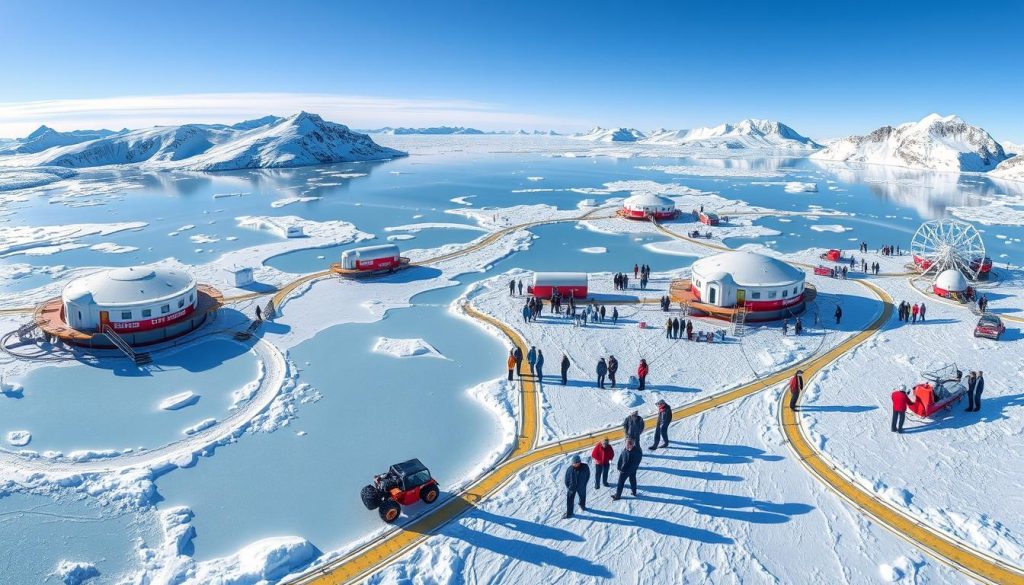
Strategic partnerships are vital in progressing work in Antarctica’s unique setting. They boost scientific research and encourage environmental care. Plus, they help businesses thrive in this tough area.
Working together in Antarctica is key for getting important resources and knowledge. Joint projects help companies do better while dealing with Antarctic challenges.
When groups join forces in research, they share expertise. This means quicker discoveries and better innovations. They also share resources, which is really useful in such a difficult place.
The Antarctic Treaty System sets rules for working together. These rules make sure everyone protects the environment. This is important to keep Antarctica’s delicate nature safe.
- Accelerated project timelines
- Access to local expertise and resources
- Enhanced capacity for innovation
- Improved efficiency in operations
Understanding the Antarctic Business Landscape
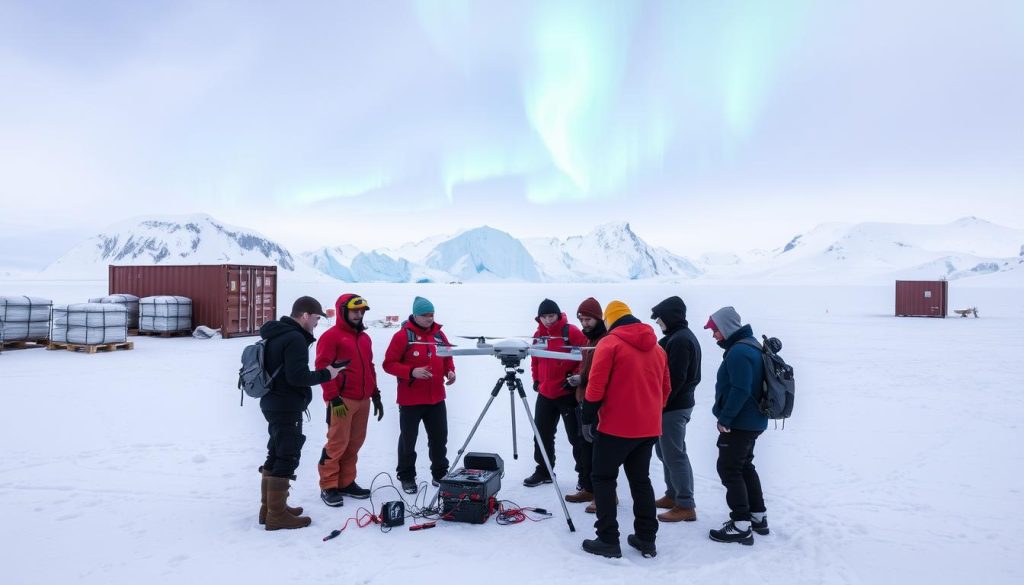
The Antarctic economy is unique due to its environment and international rules. It has areas like tourism, research, telecommunications, and logistics with big opportunities. Recently, local companies have started to use these chances, using the special qualities and location of the area.
Both worldwide firms and local businesses work in this market. They must deal with being in a remote place and follow strict rules. The Antarctic Treaty System sets rules to help research and business but also to protect the environment.
Politics also play a role in Antarctic business, affecting trade and how ventures do. Despite the chances, the tough conditions and logistical issues mean you need good planning and partnerships to do well here.
How to find business partners in Antarctica
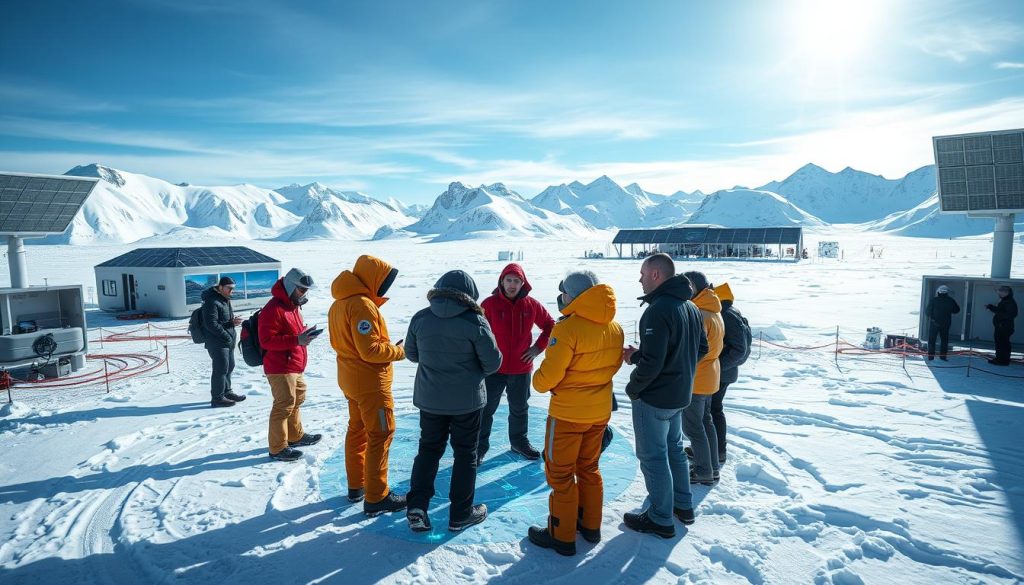
Looking for business partners in Antarctica? Keep an eye on vital sectors. Understand the culture and environmental rules there. It’s crucial to find organizations that match your goals and respect Antarctica’s uniqueness.
Identifying Key Sectors for Partnership
Antarctica has several sectors ripe for partnership, like:
- Research institutions focused on climate change and environmental science
- Environmental organisations committed to wildlife preservation
- Non-profits involved in humanitarian efforts and sustainable practices
- Private enterprises specialising in tourism and eco-friendly solutions
These sectors offer unique benefits. They help forge strong partnerships, leading to creative answers for the region’s environmental challenges.
Assessing Cultural and Environmental Considerations
Understanding the culture before teaming up is key. Respecting wildlife and following rules show you mean business. Successful projects respect:
- Understanding the cultural significance of the Antarctic environment
- Reducing the environmental impact of operations
- Adhering to international treaties that govern activities in Antarctica
Minding these factors helps form smoother, impactful partnerships. This ensures success in Antarctica’s unique business scene.
Legal Framework for Business Operations in Antarctica

The legal rules for businesses in Antarctica come from many global agreements, especially the Antarctic Treaty System. This system includes agreements that control business actions there. Its goal is to protect Antarctica’s special environment and help scientific studies.
One important rule is following environmental guidelines. Businesses must reduce harm to nature. They often need to get research permits. These permits help keep science honest and protect the area’s delicate nature.
Getting permission for logistics is also key in doing business. Companies face rules about moving supplies and people to Antarctica. Each country working there makes sure businesses follow these legal rules.
If a company breaks these rules, it could face heavy fines or be banned from future work. That’s why getting advice from lawyers who know Antarctic law is smart. They can make sure businesses follow all the right steps and rules.
Creating a Business Presence in Antarctica

Starting a business in Antarctica needs thorough planning and awareness of key factors. Choosing the right spot is very important for business success there. This means looking at established logistic spots, research areas, and places that meet the specific needs of a business in such a tough place.
Choosing the Right Location for Operations
Finding the best places to set up is crucial for firms wanting to do well in Antarctica. Here’s what to think about when choosing:
- How close it is to research stations or bases
- How easy it is to get to by ship or plane
- If there are enough resources, like fuel and supplies
Also, knowing the logistic perks of certain places can help streamline business tasks. Places with some Antarctic infrastructure can provide needed utilities, making things easier.
Infrastructure Considerations
Antarctic infrastructure offers chances and challenges for businesses. Many areas lack strong facilities, so it’s vital to check what’s there before moving in. Important things to look at include:
- Transport systems for moving goods and people
- Communication ways to stay in touch with stakeholders
- Support facilities for maintenance and emergencies
Businesses often need creative solutions to deal with sparse infrastructure. This ensures they can work well in such a distant place.
Networking Opportunities in Antarctica
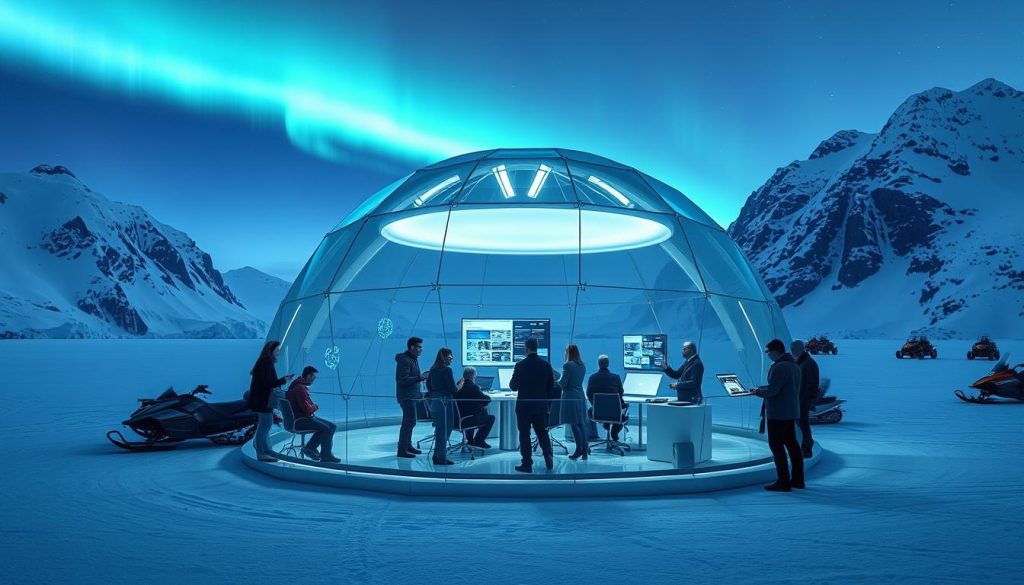
Antarctica offers unique networking chances for businesses wanting to team up in this special setting. The environment boasts various events like conferences, workshops, and industry events. These gather people from different areas to connect.
Annual events include:
- Scientific conferences focused on research and development
- Workshops dedicated to technology and innovation
- Industry events showcasing Antarctic enterprises
By joining these events, firms can create large networks. This boosts their visibility in the research world and further. Talking and working with well-known organisations and government bodies through these events can lead to successful partnerships.
Leveraging Technology for Partner Collaboration
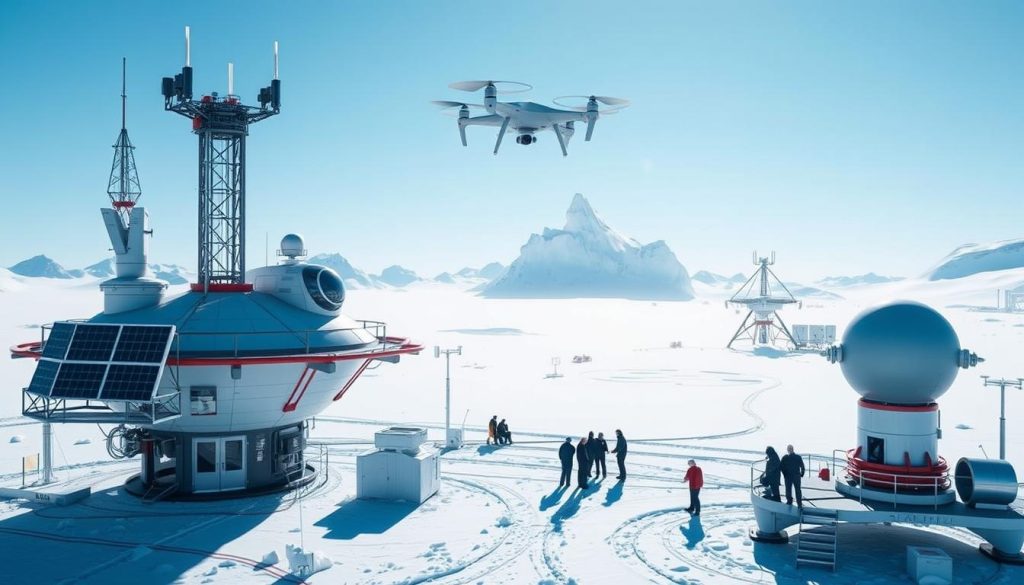
In Antarctica, using advanced technology is key for strong partnerships. Different communication tools make coordination smooth and boost efficiency. As projects grow in this remote area, using technology to overcome distance is vital.
Utilising Communication Tools Effectively
Effective communication is essential for teamwork in Antarctica. Remote teams benefit from collaboration software for managing projects and sharing data. These tools reduce confusion and keep partners informed, despite being far apart. Popular options include:
- Video conferencing platforms for live talks and presentations.
- Instant messaging applications for quick updates.
- File-sharing systems for secure document handling.
- Project management tools for keeping track of tasks and deadlines.
New technologies, like artificial intelligence, make communication tools even better. They automate simple tasks and offer valuable insights. By adopting new tech in Antarctica, partnerships can streamline their work in this challenging setting.
Best Practices for Negotiating Partnerships

Negotiating partnerships in Antarctica comes with its own challenges and chances. It’s key to build strong, working relationships for success in Antarctic deals.
To make collaborations work well, remember these important tips:
- Build Initial Relationships: Take time to know who you might partner with. Go to events and talk to people to build trust and be open.
- Understand Mutual Interests: Find out what you both want to achieve. This helps in making negotiations smooth and sets a common goal for everyone involved.
- Emphasise Clarity: Make sure everyone knows what is expected and what they should do. This avoids any confusion or problems.
- Remain Flexible: Things can change, so be ready to adjust. This flexibility helps in making deals that suit everyone.
- Respect Local Priorities: Understand how the Antarctic environment and culture affect business. Respecting this can improve your negotiation.
Keep these practices in mind to effectively work through the complexity of Antarctic partnership negotiations. Finding a balance between planning and respecting local needs is key for lasting deals.
Cultural Sensitivities in Antarctic Partnerships
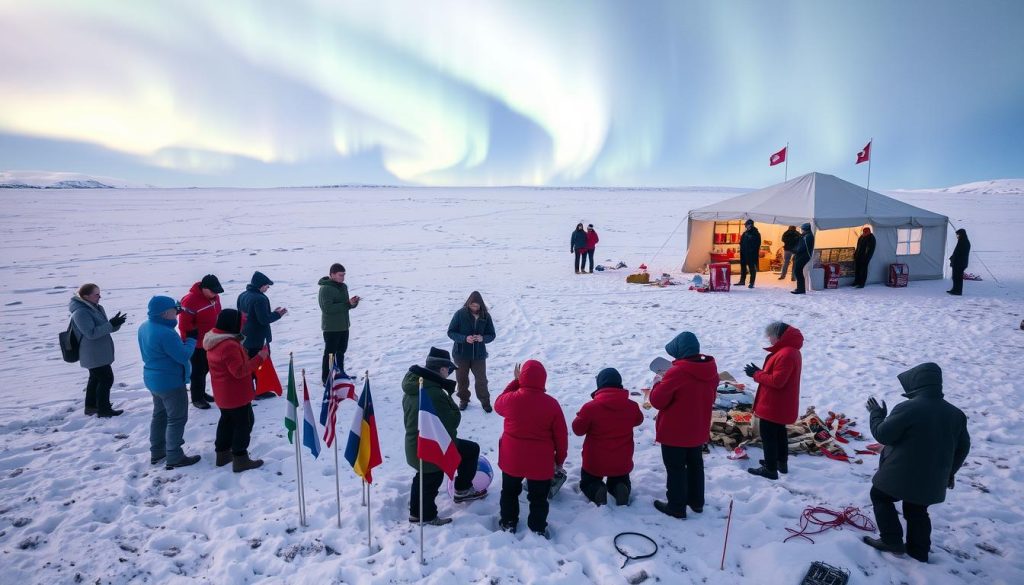
It’s vital to be culturally sensitive in Antarctic partnerships. The diverse groups and the extreme environment call for understanding local ways. Valuing these differences helps everyone work together better.
When in Antarctica, following rules is important, but so is caring for the environment. Our work should not harm this delicate area. We must consider locals’ customs and the unique surroundings.
- Recognise and respect the customs of indigenous communities, if applicable.
- Adapt business practices to align with local expectations and values.
- Engage in continuous dialogue with partners and stakeholders to understand their perspectives.
Trust is essential for successful partnerships. Showing cultural sensitivity helps form strong, respectful connections. These bonds respect our shared environment and its people.
Building Trust and Rapport with Potential Partners

In Antarctica, it’s vital to build trust and rapport for successful teamwork. Creating these elements makes it easier to develop partnerships. They lead to mutual respect and understanding. This strong base helps business relations and future projects in this tough area.
Here are key ways to build trust and rapport:
- Open Communication: Encourage honest chats to deal with concerns and hopes. Clear talking is key to mutual respect.
- Transparency: Be open about what you can do and can’t do. This truthfulness makes your partnership stronger and more reliable.
- Consistent Actions: Show you’re reliable by acting the same way and keeping promises. This builds stronger bonds and trust.
- Active Listening: Listen well to make others feel important and understood. This builds better relationships and understanding.
Working on partnerships in the Antarctic needs a strong focus on trust. Having a network built on mutual respect opens doors to new and lasting projects.
Developing Long-term Relationships

In Antarctica, building long-term relationships takes careful thought and planning. Successful partnerships rely on constant communication, trust, and a commitment to sustainability. It’s important for businesses to understand their partners’ changing needs and align their goals for success that lasts.
Keeping in touch regularly is key to keeping these relationships strong. By checking in often and sharing updates, partners feel important and included. To keep long-term partnerships going, businesses might:
- Establish clear communication channels to facilitate transparency.
- Share resources and knowledge to reinforce a collaborative culture.
- Adapt to changes in partner requirements or external conditions promptly.
- Celebrate milestones together, fostering camaraderie and strengthening ties.
Being flexible and quick to respond is very important in maintaining these connections. As things change, being willing to adjust helps keep partnerships going in Antarctica’s tough environment. A focus on sustainability not only improves how a business operates but also strengthens the relationship between partners.
Exploring Funding and Financial Support Options
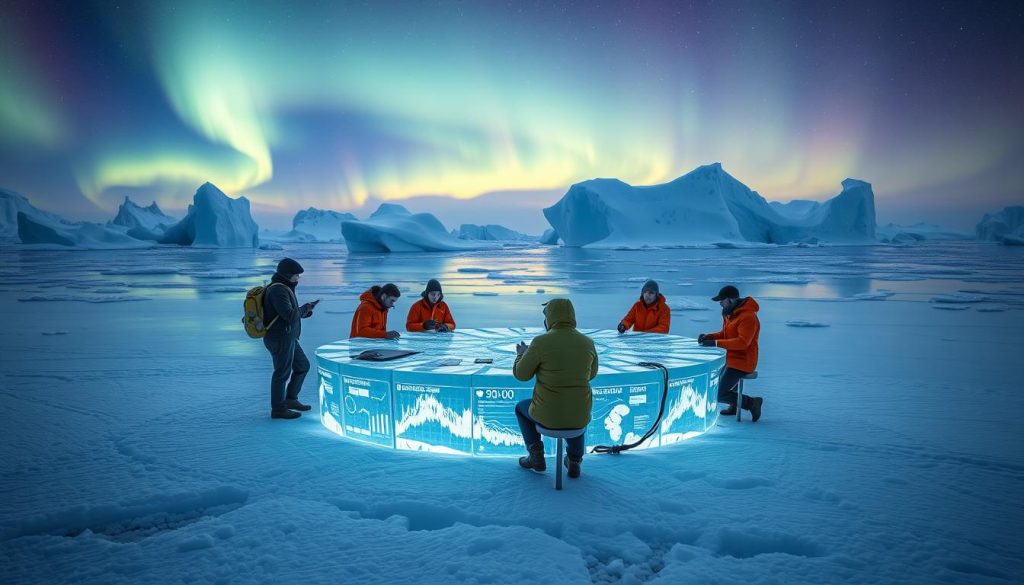
Businesses aiming to set up in Antarctica have various funding options. These opportunities are designed to meet specific needs. It’s essential to know what financial support is available to succeed in this unique place.
Potential funding avenues include:
- Government grants aimed at promoting Antarctic research and sustainable initiatives.
- Private investment sources that seek innovative projects aligned with environmental stewardship.
- Collaborative funding initiatives from international consortia focused on Antarctic projects.
Finding the right investment sources is very important. To get financial support, businesses might need to work with groups focusing on sustainable growth and science in Antarctica. Many groups want to partner up to help Antarctic projects grow, offering great chances for working together.
Using these funding options can make projects more viable. This allows businesses to match their goals with what their financial backers are interested in. By grasping these aspects, firms can better draw the support they need in this difficult but promising area.
Monitoring and Evaluating Partnership Success
In the tough and unpredictable world of Antarctica, checking and valuing partnership success is key. Having clear success measures helps businesses know their achievements and see where to improve. With these measures, groups can tell how well their Antarctic partnerships are doing and make sure they reach their goals.
It’s vital to have regular checkpoints to look at progress. These moments let partners talk about what’s going well and what isn’t, encouraging open communication. Keeping an eye on progress shows what’s working and spots problems early. This means teams can change their plans when needed due to new situations or rules.
Also, having a good feedback system keeps partnerships fresh and effective. It ensures everyone’s aims match up with the current objectives. By focusing on evaluating partnerships, organisations boost their success chances. This also helps the collective effort in Antarctica.
















